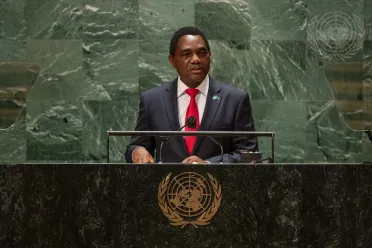Statement
Statement summary
HAKAINDE HICHILEMA, President of Zambia, said his people recently ushered in a new Government through a peaceful democratic election, at a time when the country and the world are grappling with the COVID-19 pandemic and its far-reaching socioeconomic impacts. Among other things, it has disturbed trade flows, supply chains and economic activities, caused loss of life, increased poverty, stressed health-care systems and prevented the delivery of education to learners — particularly in developing countries. While a key part of Zambia’s preparedness, mitigation and response plan is vaccination against COVID-19, it has only been able to vaccinate about 3 per cent of its population to date. “This clearly highlights the inequitable access to vaccines in developing countries,” he stressed, emphasizing that the global recovery hinges upon mass vaccinations across the globe.
Welcoming the Assembly’s focus on such crucial initiatives as the African Vaccine Acquisition Trust and the global COVAX facility, he called for concerted and enhanced global efforts to promote investments in local manufacturing capacity and technology transfer on vaccines, related infrastructure, human capital, and research and development. Meanwhile, Zambia’s new Government will work to strengthen oversight and governance institutions, fight corruption, and promote a free media and an active civil society. Among its highest priorities are the restoration of macroeconomic stability, the attainment of fiscal and debt sustainability, and the promotion of economic growth and diversification.
To complement those efforts, he said, Zambia has embarked on an ambitious economic and social transformation agenda, with a view to creating equitable opportunities and poverty reduction — especially youth and women. To that end, he described a range of interventions aimed at raising the country’s productivity in agriculture, mining, energy, financial services, tourism, technology, health and education. However, he stressed that the challenges facing the global economy are more complex than ever, marked by pandemics, climate change and illegal migration. “It is imperative that we adapt to these effects of globalization by fostering key partnerships and deepening integration at all levels,” he said, spotlighting the United Nations critical role.
In particular, he continued, the 2030 Agenda continues to “set the tone” and lay out benchmarks for countries to incorporate sustainability into their development policies. Closer cooperation and support for capacity-building is needed to adopt better, safer, more modern and climate change-sensitive methods of productivity. Silencing the guns also remains a critical priority and goes beyond addressing conventional warfare. It means addressing new emerging threats such as extremism, international terrorism, cybercrime, asymmetric warfare, and the proliferation of nonconventional weapons and organized crime. “As an international community, we need to continue to work together to address the root causes of these global threats,” he stressed.
He noted that Zambia also continues to play an active role in the Southern African Development Community (SADC) mission in Mozambique — aimed at restoring peace to Cabo Delgado province — and stands committed to the Lusaka Master Roadmap to Silence the Guns in Africa. However, at the global level, it remains concerned with the slow pace of negotiations over reforming a more representative and democratic Security Council. In that vein, he reiterated the African common position, known as the “Ezulwini Consensus”, which calls for the continent and all other world regions to be fairly represented on the Council. Zambia remains committed to economic diplomacy and multilateralism through open and cordial relations with the international community, he concluded.

